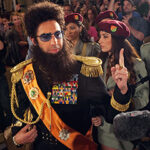Polarizing Comedy Exposed in The Dictator
By Armond White
Lazily titled after Chaplin’s 1940 Hitler-Mussolini satire The Great Dictator, Sacha Baron Cohen‘s new film The Dictator is part of our current political slackness where propaganda is confused with news, parody is confused with satire, principle is confused with bias and mob-mentality is confused with democracy.
 Cohen mocks an archetypal Middle East/African dictator–Iraq’s Saddam Hussein, Iran’s Ahmadinajad adding a little of Libya’s Moamar Quaddafi–in the figure of General Aladeen of Wadiya. As the bushy-bearded despot, Cohen makes fun of torture and killing–the humanitarian disasters that have become daily entertainment for newsmedia. In a thick, gutteral blur of Arabic and Yiddish, Cohen spouts the cliché regional bigotry that he takes no more seriously than his amateurish director Larry Charles takes comic timing, composition or political argument.
Cohen mocks an archetypal Middle East/African dictator–Iraq’s Saddam Hussein, Iran’s Ahmadinajad adding a little of Libya’s Moamar Quaddafi–in the figure of General Aladeen of Wadiya. As the bushy-bearded despot, Cohen makes fun of torture and killing–the humanitarian disasters that have become daily entertainment for newsmedia. In a thick, gutteral blur of Arabic and Yiddish, Cohen spouts the cliché regional bigotry that he takes no more seriously than his amateurish director Larry Charles takes comic timing, composition or political argument.
In this era of polarized pop culture, Cohen and Charles are only about opportunism, which means The Dictator reverses Chaplin’s bold and inventive comedy that was intended to unite audiences through humane, not politicized, appeals. The plot of Aladeen visiting the U.S. where a factotum (Ben Kingsley) plans his assassination through the employment of a lookalike, trashes politics. Having as much to do with Eddie Murphy’s Coming to America as it does with The Great Dictator; it’s just fatuous borrowing–a stretched-out SNL skit.. (Which explains questionable cameo appearances by Megan Fox, Edward Norton and a daring George Clooney-proxy.)
But anyone who knows the Chaplin classic will not recognize its likeness here, especially not in the summary speech Aladeen gives–essentially a routine, anti-George W. Bush attack. Cohen and Charles fall back on Boratisms to shore up their Jon Stewart-Bill Maher niche audience. Their divisiveness provides none of the culture-clash insight of Adam Sandler’s superior You Don’t Mess with the Zohan.
Instead, The Dictator’s view of totalitarianism (as simplistic and obnoxious as in Borat) seem keyed into White House policy of early 2011 before the Arab Spring and the rousting of Quaddafi. The Dictator has lately been outpaced by recent political developments which expose Cohen and Charles’ dated humor and lack of sophistication. They’re merely rude as when Aladeen meets and insults a feminist protestor (Anna Faris). Example: “A girl in college is like a monkey on rollerskates; it means nothing to him but it‘s funny to us.” Aladeen’s sexist, racist jokes are simply the kind that Liberals congratulate themselves for recognizing as jokes; they feel hip because they feel impervious. “Political comedy” like this is not based on wit but on the Left’s perception that they alone can claim unanimity of political opinion.
Although The Dictator is not a timely or accurate political comedy, its worst fault is refusing to address the very concept of dictatorship or cultural intimidation. The filmmakers lack the courage to have Aladeen confront the totalitarian Liberalism of the Occupy Wall Street folly that oppresses all opposition, or to imagine Aladeen fording the tsunaminity of Obama followers–the bias that castigates Obama-skeptics as being non-p.c., glorifying Obama in flipside despotism. We need a real comic intelligence to clarify those issues.
But at least The Dictator doesn’t resort to the mockumentary stunt that made Borat and Bruno so appalling. This film is more conventional, almost vaudevillian, which helps prove the difference between political satire and simple buffoonery. The Dictator reflects no real political thinking and doesn’t effect any either, besides exposing the dubious exploitation of 9/11 fears. Yet in a tourists’ helicopter-over-Manhattan scene, Cohen and Charles are not above using Muslimphobia just to make stereotypical Middle Americans seem absurd. The Dictator is Cohen and Charles funniest film simply because it minimizes its political pretense with what is essentially throwaway humor. It can also be thrown away.
